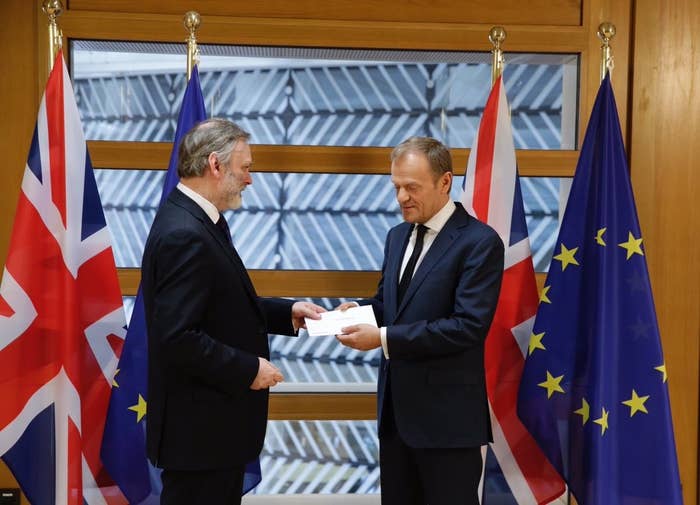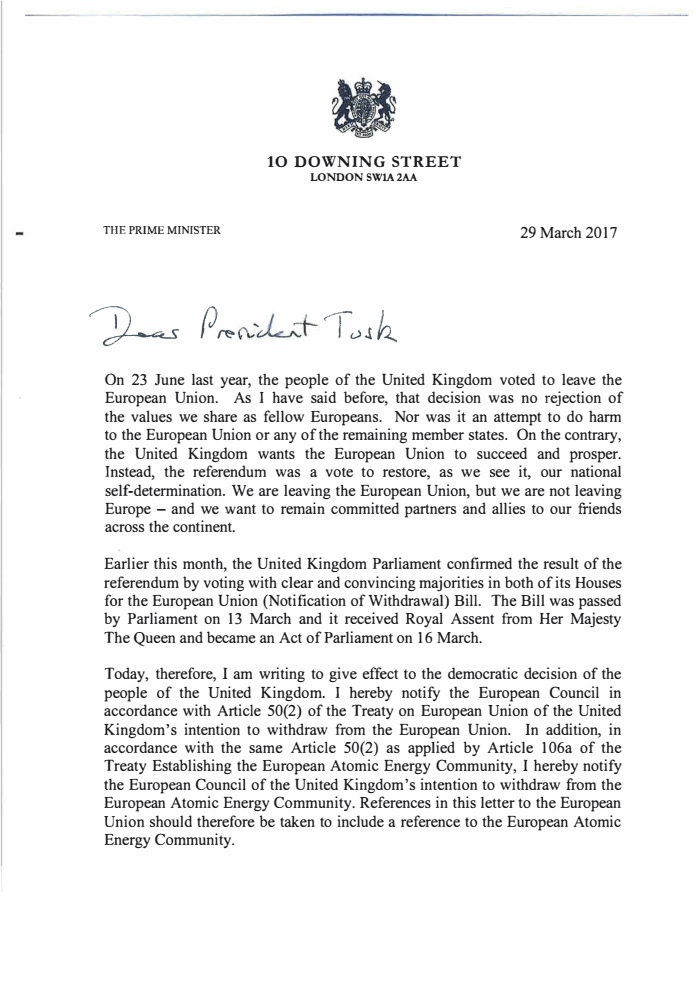
Theresa May has triggered Article 50 with a letter that sets out her hope that Britain and the EU will continue to have a "deep and special relationship", while also hinting strongly that security cooperation would be at stake if a deal is not reached.
The decision means the UK now faces a two-year deadline to agree divorce terms and achieve a new trade deal with the EU before Brexit finally takes place in March 2019.
In the letter May repeatedly mentions her desire to reach an agreement that benefits both sides. But she also warned that in a worst-case scenario the UK is willing to exit the EU without a trade deal and that "a failure to reach agreement would mean our cooperation in the fight against crime and terrorism would be weakened".
The letter also reveals that the prime minister:
- Desires an "early agreement" clarifying the rights of EU citizens living in the UK and UK citizens living in the EU.
- Wants negotiations on a trade deal to begin as soon as possible, against the wishes of EU officials who first want to focus on the terms of the UK's withdrawal.
- Accepts that UK companies will have to obey rules over which they will have little influence.
- Wants a trade deal completed by the end of the two-year deadline, and then a phased period of implementation.
- Expects Brexit to result in a "significant increase" in the powers of devolved administrations in Scotland, Wales, and Northern Ireland.
The formal process of Brexit began when Theresa May signed a six-page letter in Downing Street’s cabinet room on Tuesday night, setting out the UK’s initial negotiating position and declaring the intention to leave the EU.
The letter was transported to Brussels by Eurostar train late last night before being handed over to Donald Tusk, the president of the European Council, by UK ambassador Sir Tim Barrow shortly after midday on Wednesday.
It was the act of handing over this letter that constituted the formal notice that the Brexit process is now underway, nine months after the Leave campaign won the EU referendum. Tusk's team did not allow TV cameras to be present for the moment of handover, which began the departure of a major EU territory for the first time in the organisation's 60-year history.
After nine months the UK has delivered. #Brexit
"This is an historic moment from which there can be no turning back," May told the House of Commons shortly after the letter was delivered in Brussels. "We are going to take control of the things that matter most to us."
The prime minister described Brexit as a "great turning point in our national story" and said she believed the "enduring power of the British spirit" would help make it a success.
May's letter heavily emphasises the security risks of failing to agree an early deal, mentioning the word "security" no fewer than 12 times. In one section, May writes: "In security terms a failure to reach agreement would mean our cooperation in the fight against crime and terrorism would be weakened. In this kind of scenario, both the United Kingdom and the European Union would of course cope with the change, but it is not the outcome that either side should seek."
And she is even more explicit in her concluding section: "Europe has a responsibility to stand up for free trade in the interest of all our citizens. Likewise, Europe’s security is more fragile today than at any time since the end of the Cold War. Weakening our cooperation for the prosperity and protection of our citizens would be a costly mistake."
Liberal Democrat leader Tim Farron described May's linking of security to a trade deal as a "blatant threat", while Labour's Yvette Cooper warned such a move was a risk to Britain: "This is not a threat to the rest of Europe, it would be a serious act of self-harm. She should rule out now walking away with no security deal as our national security and public safety depend on it."
May defended the tactic. In response to Labour MP Stephen Kinnock, who accused her of using security as a "bargaining chip", she replied: “We’re not going to be trading the security of our country but we have a relationship with the EU... There are certain elements of the EU in justice and home affairs that we’re currently members of that in leaving the EU we will not be members of."
She added: "It’s very simple, it’s very pragmatic, but the aim of this will be to ensure cooperation on these matters.”
The prime minister’s official spokesman denied that security cooperation was being used as a bargaining ploy.
"It’s a simple statement of fact that if we leave the EU without a deal, the arrangements that we have with the EU institutions, and other EU measures, will lapse,” he said, suggesting it could impact Britain's involvement in EU-related law enforcement measures such as the European Arrest Warrant and the Europol agency.
Senior European officials told BuzzFeed News they weren’t surprised by the mention of security in May’s letter, and didn’t interpret it as a threat. But if it had been a threat, they added, they saw it as an empty one.
A more contentious point for European governments was the fact May appeared to imply in her letter that she wanted exit and trade talks to take place in parallel, despite the EU and member states having repeated on a number of occasions – both publicly and privately to UK officials – that they want the principles of withdrawal settled before moving on to talk about the future relationship.
German Chancellor Angela Merkel was quick to slap down any call for parallel EU-UK talks.
German Chancellor Angela Merkel has rejected PM's call for Brexit negotiations to run in parallel with talks on defining future relationship
As the letter was being delivered, May was taking part in Prime Minister's Questions, before delivering a statement to the House of Commons setting out Britain's negotiating stance going into the Brexit negotiations.
She said she wanted a "deep and special partnership" with the EU after a "smooth and orderly" Brexit, reaffirmed that the UK would seek to leave the single market, and said the UK's devolved assemblies will gain significant extra powers in the process.
"Our vote to leave the EU was no rejection of the values we share as fellow Europeans," she said. "We will continue to be reliable partners, willing allies, and close friends. We want to trade with them as freely as possible."
May also insisted she will seek an arrangement that ensures British companies can still trade with the EU, while emphasising that the UK is aware that "we will lose influence over the rules that affect the European economy".
Labour leader Jeremy Corbyn said the government was taking a "reckless and damaging" approach to negotiations.
The letter that triggers #Article50 and the #Brexit countdown is being delivered by Sir Tim Barrow in Brussels
Downing Street said the prime minister would use her statement to pledge to "represent every person in the whole United Kingdom – young and old, rich and poor, city, town, country, and all the villages and hamlets in between".
Number 10 confirmed this would include EU nationals who already live in the UK, despite the government fighting hard against efforts by opposition politicians to include a specific commitment to protect their rights.
The UK is now facing a hard deadline to come to an agreement within two years, with Britain set to leave the organisation by 29 March 2019 unless both sides agree to extend talks.
May also explicitly raised concerns about the border between the Republic of Ireland and Northern Ireland, emphasised her desire to conduct negotiations for a new agreement alongside exit negotiations, and said this was not about a cultural split.
"Perhaps now more than ever, the world needs the liberal, democratic values of Europe," she wrote.
An initial EU response to the letter will be published on Friday, with EU leaders set to meet on 29 April to formalise this position. Negotiations will then begin in earnest by the following month.
"We regret that the United Kingdom will leave the European Union, but we are ready for the process that now will have to follow," the European Council said in a statement. "In these negotiations the union will act as one. Our first priority will be to minimise the uncertainty caused by the decision of the United Kingdom for our citizens, businesses, and member states. Therefore, we will start by focusing on all key arrangements for an orderly withdrawal."
The statement added: "In the future, we hope to have the United Kingdom as a close partner."
Tusk held a brief conference shortly after receiving the letter, in which he told reporters that the remaining 27 EU countries would remain united in the negotiations ahead.
However, Tusk added: “There is nothing to win in this process, for both sides. It is about damage control.”
The president of the European Council also stressed that EU law would continue to apply to, and within, the UK until Britain actually leaves. He also confirmed that the first step of the process will be the adoption of guidelines for the negotiations by the European Council at the end of next month.
Tusk ended the press conference on an emotional note: "We already miss you. Thank you and goodbye.”



